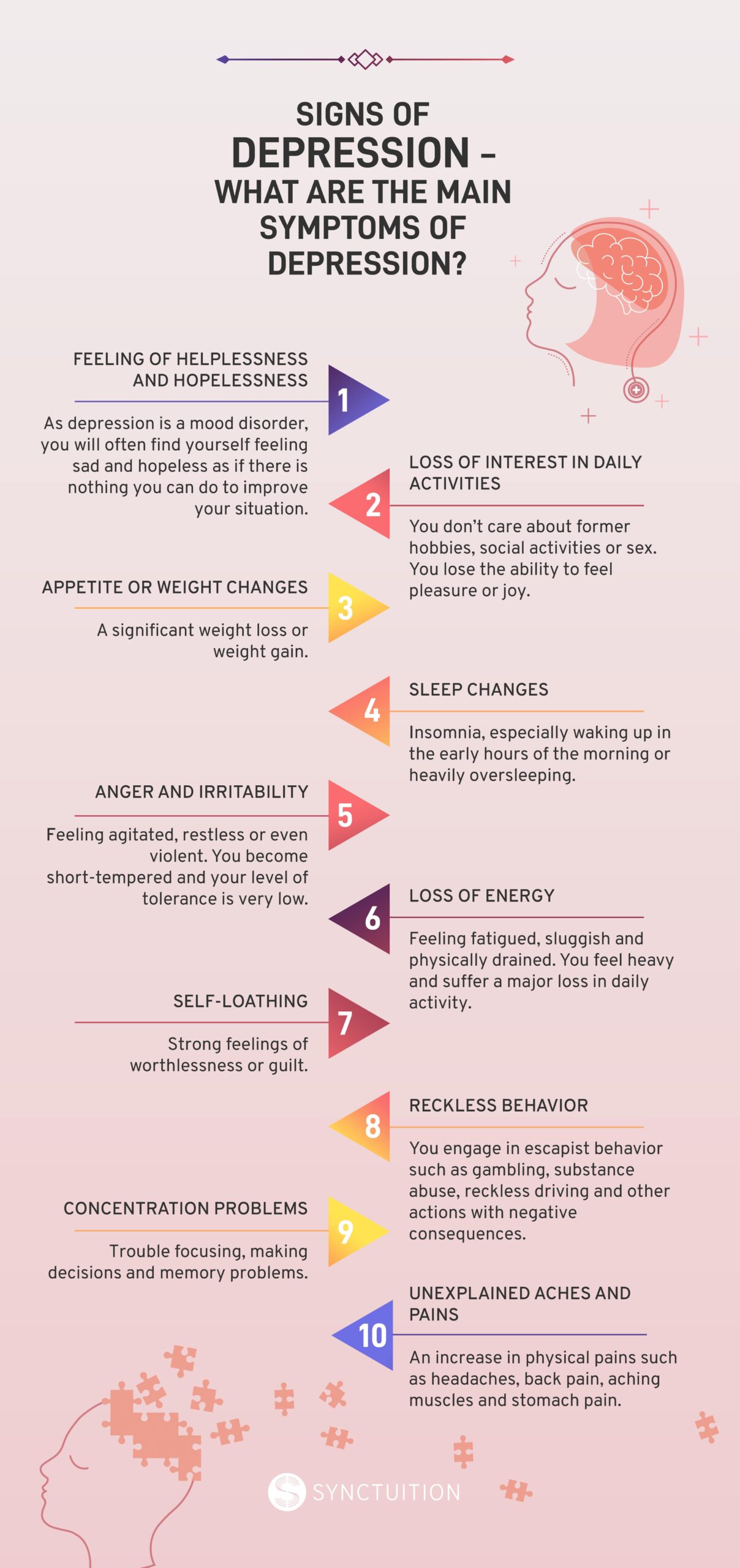7 Natural Ways to Deal with Depression
“The world is a much better place than you think it is.” That was the core message of Hans Rosling’s international best-selling book “Factfulness”. And while Rosling was able to provide a substantial range of statistics, there is something quite worrying behind this mirage of positivity.
In contrast to a lot of positively trending statistics, there is one outlier that simply cannot be ignored. Currently, major depression rates and mood disorders, worldwide, are skyrocketing at an alarming rate. In fact, according to NBC news, major depression rates amongst Americans in all age groups have climbed by a staggering 33% in the last few years alone. It is for this reason that the World Health Organization has recently listed depression as the leading cause of ill health and disability worldwide.
We have it all, yet…
If we are really living in a time where science and medicine are progressing faster than ever before, a time where people are living longer and where technology has made the world truly borderless then…
Why are we so unhappy?
Mental health has become a critical issue today. Yet, if we were to be honest, how much do we really know about depression? How can we identify the symptoms and signs of severe depression early on? Above all, how can we cope with and overcome depression using just the strength of our minds and bodies alone? We aim to try and answer how to deal with depression using natural remedies throughout this article as well as tackling all of these questions.

Depression rates are skyrocketing
Before determining how to cope with depression, it is important to understand what some of the causes of depression are. We live in a fast-paced world that forces us to work longer days, take less vacation time, and retire later. To add insult to injury, we have to deal with job insecurity, as an increasing number of companies are laying off workers to save costs.
According to the International Labour Organisation, people in the US are working longer hours than anyone else in the industrialized world. Japan, a county placed second on this list, has reached an unthinkable level of work-related mental stress and depression. It is witnessing a record number of compensation claims related to death from overwork and suicide due to workplace stress. In fact, they have even labeled this phenomenon “Karoshi”. Karo meaning “overwork” and shi meaning “death.”
A crippling, man-made virus
Adding to work stress, there is another cause of chronic depression which is, arguably, a lot more dangerous. The unprecedented level of information we are exposed to daily can be very toxic to our mental health.
We are bombarded with an onslaught of information on a daily basis through the magic of the Internet and with the accessibility of smartphones. This low barrier to entry and ease of access has given birth to an era where fake news, propaganda, and misinformation are thriving. This phenomenon has spread suddenly, like cancer over social media and traditional news websites alike. According to Statista, more than 34% of the North American population trust news and stories that they read on social media. With such a significant part of this information being false and harmful, we have created a “man-made” virus. Almost every one of us is a carrier and we enthusiastically share it with our peers daily.
Information overload = emotional overload
It may seem as though the daily dose of information we are exposed to is harmless, however, this is not entirely true. In fact, a large portion of it is purely destructive and dangerous. We can feel extremely overwhelmed because of exposure to too much information or having to make too many choices. The scientific term for this is called information or cognitive overload. As a result, this information overload causes us to experience analysis paralysis. A phenomenon where our brains enter a sort of power-saving mode and by default, passively default to a ‘wait and see’ state.
Cognitive overload often leads to indecisiveness, hasty, and often bad decisions. It can also cause a reduced level of daily activity, moodiness, anxiety, and ultimately, chronic depression. What makes it so dangerous is that one almost never associates their depressive state with exposure to toxic information. This way, the virus survives in our minds for ages, completely undetected.
When fake seems real and why do we trust what we consider familiar?
What makes fake news and negative information such effective weapons?
A research team from Stanford University led by psychologist Sam Wineburg has found that Americans of all ages, from digitally savvy tweens to high-IQ academics, fail to ask important questions about content they encounter on a browser, adding to research on our online gullibility. Other studies have shown that people retweet links without clicking on them and rely too much on search engines. A 2016 Pew poll found that nearly a quarter of Americans said they had shared a made-up news story.
This lack of fact-checking can be attributed to a “familiarity heuristic”. Simply put- our tendency to assume that if something is or sounds familiar, it must be true, good, and safe. With the sheer amount of information we receive on a daily basis, none of us have the time to fully research what we read.
So how do we decide what is true? Well, our brain tends to subconsciously rate stories as accurate if parts of the story resemble something we have heard before- a very easy human flaw to exploit in an online environment.
Identifying the main symptoms of depression
It is crucial that we know the warning signs of depression. By knowing the signs, we are able to identify depression and learn how to cope with it.
With the global reach of the internet and the popularity of social media, things have gotten a lot worse. Most people today cannot tell the difference between a good source and a bad one, a legitimate story and one that is made up. We often cannot tell if what we are reading is true and good or if we are simply feeding into someone’s malicious agenda of aiming to spread misinformation. Our brains soak it all in, like a sponge… After a while, we begin to notice that our moods change. It’s not known why, but we certainly feel more comfort from our smart devices than from our own friends and loved ones.
We start to feel the need to stay home or “work-late” instead of socializing and slowly begin to lock ourselves into an unhealthy cycle of negative thoughts. We begin to feel sad, exhausted, and restless. Our lifestyle patterns begin to change and we start sleeping bad, eating unhealthy, and so forth.
According to HelpGuide, here are the 10 most common depression symptoms:

Recognizing Chronic Depression
Having learned the main symptoms of depression, it’s important that we establish the definition of depression. After extensive research conducted by leading doctors, depression is now officially categorized as a mental disorder. It causes a chronic feeling of sadness and a long-lasting loss of interest. But chronic depression doesn’t only affect your mind! It can lead to many adverse health problems including physical illness, mental illness, emotional instability, and social problems.
Depression has become such a common mental disorder that according to the World Health Organization, more than 300 million people globally, from all age groups, suffer from it. Interestingly, more women are affected by depression than men.
Depression affects people’s daily lives by making them more socially isolated and affecting cognitive function, especially memory. Commonly, continuous depression can lead to higher risks of heart disease and death from various illnesses.
What causes Depression?
Stress and recurring negative thoughts are two major causes of depression, so it is important that you understand how these two factors affect the body. Our immune system is a complex group of cells and organs that defend the body against disease and infection. Stress causes these cells and organs to release hormones that trigger the production of white blood cells (which fight infection). While this stress-triggered hormone release is essential for preparing the immune system to respond quickly to injuries and short-term illnesses, this activity is not healthy for your body if it continues for a prolonged period of time.
Thus chronic depression and anxiety result in chronic stimulation of the immune system that causes a chemical imbalance, making it become suppressed and less effective at warding off these diseases and infections.

Researchers have learned that cells in the immune system release chemicals called “cytokines” which act as messengers, allowing cells to “communicate” with one another and give instructions to develop additional cells that help to fight infection. During long periods of stress, the production of “cytokines” is hindered, therefore not allowing the immune system to coordinate and fight the infection. It is for this reason that people who are chronically stressed easily succumb to colds, infections, and other diseases.
Treat depression by yourself
As dangerous and common as depression has become, it is also among the most treatable mental disorders. With the amount of research being done on the subject, we are learning that if the symptoms of depression are recognized early on, it is possible to deal with depression by yourself. In fact, some of the most effective ways to cope with and overcome depression require absolutely no medical intervention or treatment. Here are 7 natural remedies for depression that anyone can use by themselves:
1. Get a Routine
Psychiatrist and director of the Depression Research and Clinic Program at UCLA, Ian Cook, MD. says depression can strip away the structure from your life by letting one day melt into the next. Setting a gentle daily schedule and routine can help you get your life back on track.
2. Set goals
Depression often carries a feeling of worthlessness in which you feel like you can get nothing done. This only makes you feel worse about yourself and drags you into an even deeper state of depression. To push back, set small daily goals for yourself that you can definitely accomplish. Small successes will build up and help you to get your self-confidence back.

3. Eat Healthily
While a “depression curing” diet is yet to be discovered, it’s a good idea to watch what you eat, as it will give your body a sense that it can control itself. While there is nothing definitive, evidence shows that omega-3 fatty acids often found in fish (like salmon and tuna) and folic acid (spinach and avocado) help to ease depression.
4. Exercise
Exercising produces ‘feel-good’ chemicals called endorphins which give healthy bodies a temporary boost. Endorphins are known to have long-term benefits for people who are coping with depression. Regular exercise and daily activity seem to help the brain to rewire itself and encourage positivity.
5. Do something new
Challenging yourself to do something different creates a chemical change in your brain while you are depressed. This often alters the levels of dopamine, which is associated with pleasure, enjoyment, and learning. Pick up a new book, go to a museum, start cooking or pick up a hobby. This is very likely to help you recover much faster.
6. Get enough sleep
Not getting a good night’s sleep is one of the most common symptoms of depression. To make matters worse, this lack of sleep only further damages your mental health, causing a deeper and longer-lasting state of depression.
Start by making small changes to your lifestyle. Try going to bed and getting up at the same time to make your body fall into a routine. As you are falling asleep, try to calm yourself down with the use of music, or quality guided audio meditation.
7. Meditate
Stress and anxiety are major triggers of chronic depression. Meditation has proven to be one of the most effective methods to alter your reaction to those feelings. According to Harvard Health Publishing, “Meditation trains the brain to achieve sustained focus, and to return to that focus when negative thinking, emotions, and physical sensations intrude – which typically happens a lot when you feel stressed and anxious.”
Meditation can physically change the brain
All of the above-mentioned methods will help you in overcoming depression and get you back on track, especially if you are able to follow a few of them at once. However, if there is one area we recommend putting the most effort into, it is meditation.
Why? Because meditation has been found to physically change certain brain regions that are specifically linked with depression.
Here is some basic science:
Harvard Health Publishing has shown that a part of the brain called mPFC or “me center”, which is responsible for processing information about yourself, such as worrying about the future or reminiscing about the past, becomes hyperactive in depressed people.
The amygdala, better known as the “fear center”, is the second important brain region associated with depression. This part of the brain is responsible for the fight-or-flight response which triggers the adrenal glands to release stress hormones in response to fear and danger. While our ancestors needed this instinct to survive on a daily basis, we do not. And yet, we as a society, still manage to trigger this fight-or-flight stress response a few times per day with simple day-to-day financial difficulties, relationship worries, career problems, etc. As a result, we are in essence, straining our body with this nasty cocktail of chemicals on a regular basis.
These two brain regions work in tandem to cause what we know as chronic anxiety or depression. Typically, the “me center” goes into overdrive reacting to stress and anxiety, and the fear center response leads to a spike in stress hormones to fight a danger that, in reality, only exists in our mind.
Why is Meditation the ultimate anti-depressant?
What is the importance of meditation and how does it help to cope with depression? Regularly meditating (15-30 minutes a day) is one of the best ways to overcome depression according to Harvard Health. This helps break the connection between these two regions of the brain.
As this connection withers, you will no longer assume that a momentary feeling of fear means something must be wrong with you. This also explains why the more you meditate the more your anxiety decreases. Dr. John W. Denninger, director of research at the Benson-Henry Institute for Mind-Body Medicine at Massachusetts General Hospital believes that:
“When you meditate, you are better able to ignore the negative sensations of stress and anxiety, which explains, in part, why stress levels fall when you meditate”.
As Britta Hölzel, another researcher in MHG said, “It is fascinating to see the brain’s plasticity and that, by practicing meditation, we can play an active role in changing the brain and can increase our well-being and quality of life”.
The results of meditating
A study conducted by Harvard found that the effects of meditation and mindfulness exercises begin to take effect as soon as eight weeks after starting the practice. As Amishi Jha, a University of Miami neuroscientist said: “These results shed light on the mechanisms of action of mindfulness-based training. They demonstrate that the first-person experience of stress can not only be reduced with an eight-week mindfulness training program but that this experiential change corresponds with structural changes in the amygdala”.
In simple terms, while meditation doesn’t eliminate stress or erase negative thoughts, it does help your body understand these emotions and effectively deal with them without immediately acting on them. One of the benefits of meditation is that it can provide some distance between you and negative thoughts or stressful feelings and allows you to recognize that while these feelings may affect you, they are not you.

So many different ways to meditate…
These days there are dozens of different types of meditation and mindfulness exercises that are available to help you reach a state of heightened awareness. All of which are specifically intended to help you cope with depression and anxiety. The choice really depends on your lifestyle, preferences, and interests.
However, one thing is absolutely critical: while meditation is without a doubt one of the best ways to fight depression, it is important that you keep meditating regularly in order to maintain the gains you have made in fighting the illness. Why? Because the brain can very easily revert back to its old ways if you are not consistent. This means that you have to keep a regular practice to ensure the new neural connections you made while meditating stay strong.
To be fair, after you experience the change in your mind and body, meditating will not be a burden. Rather, it will become one of the most enjoyable parts of your day.
“Over-the-counter” Relaxation
Mindfulness Meditation
This is considered to be the mother of all meditations, as many other meditations have stemmed from it. Mindfulness meditation is a mental training practice that involves focusing your mind on your experiences (thoughts, emotions, feelings) in the present moment. It is an act of paying attention to whatever you are experiencing as you experience it. This kind of meditation often involves breathing practice, mental imagery, awareness of the body and mind as well as muscle and body relaxation.
A study published in JAMA Internal Medicine, suggests that mindfulness meditation can help ease psychological stresses such as anxiety, depression, and pain.
Yoga
Yoga combines physical postures with breathing techniques and meditation. Some forms of yoga incorporate chanting and include techniques to manage fear and replace negative thoughts with positive ones. Several studies are finding that yoga can ease anxiety, depression, and panic. It also has positive effects on the quality of sleep and quality of life of people who suffer from some sort of anxiety disorder.
Transcendental meditation
Transcendental meditation, commonly referred to as TM is very popular around the world. Instead of breathing to focus your attention, TM uses a personal sound or “mantra” which is often one or two syllables long.
An innovation in mindfulness meditation – The guided audio meditation
While the classic forms of meditation discussed above are both effective and popular, the industry is experiencing explosive growth in a new form of mindfulness meditation. This trend revolves around very high-quality, curated guided audio meditation programs. Mindfulness meditation is gaining an incredible following around the world as it is extremely simple to use and is often consumed as a simple audio session just before going to sleep.
This form of meditation is gaining traction for two main reasons:
1. It is extremely easy to use and you need no previous experience in meditation.
2. Guided meditation works on your subconscious mind, feeding it positive messages and mental images. The subconscious mind will then conspire with your desire to create it – as long as you believe in it. This makes it one of the easiest ways to deal with depression.
The world in High Definition – guided imagery meditation
According to Healthy Set Go, “One of the most powerful, yet simple, self-awareness tools is guided imagery. It uses words and images to help move your attention away from worry, stress, and pain. Guided imagery will help you find your own inner strength and creativity. This brings the natural powers of the mind into health and healing.
Through guided imagery, you can learn to use your imagination to “create the state you want”. This means that you can actually change how you are feeling by changing your focus.
Guided imagery can have many health-related physical and emotional benefits. It can help you feel less nervous or upset, and be less bothered by pain. Furthermore, you can even achieve a goal such as athletic or academic achievement. Elite athletes use guided imagery to imagine themselves performing at their best, and research suggests this helps their performance.”
A standout in the crowd of audio meditation and binaural beats
This category of meditation gains massive popularity, and there are quite a few companies that offer a diverse range of products. From basic guided voice meditation to soothing and relaxing meditation music, the selection of guided meditation can satisfy any taste. However, our company is taking it a step further. We are investing massive amounts into producing world-class quality products and pushing the boundaries to take this category to a whole new level.
So what is Synctuition doing differently? Well, we have created the world’s first 3D audio meditation product that uses a combination of binaural beats and 3D sounds. These stream at just the right frequencies which immediately brings the listener to a pleasant meditative state. While listening through stereo headphones, these journeys take you on a relaxing lucid dream through your imagination. This guides you to a state of total relaxation allowing you to unwind and forget about stress and anxiety.
Unlike regular music or other meditation programs on the market, MindSpa stimulates the brain. Our program molds neuroplasticity to create millions of new synapses that promote increased creativity, faster intuition, and better decision-making. The increased brain connectivity helps to keep the brain refreshed and the mind rejuvenated.
In that sense, MindSpa works exactly like a mind spa. It clears your mind of negative and toxic events before going to sleep, helping you wake up to a refreshing and far more positively charged morning.
Keep your chin up!
With the amount of negativity in the world, it is imperative to try to keep your focus on positive thoughts. You constantly have to work on feeding your subconscious with positive imagery. It is welcoming to see mental health becoming such a widely discussed topic; not just amongst researchers or academia, but both in the corporate world and at home.
Depression is not something to be ashamed of, rather it is one of the most common disorders that can be easily treated when it is identified early on.








